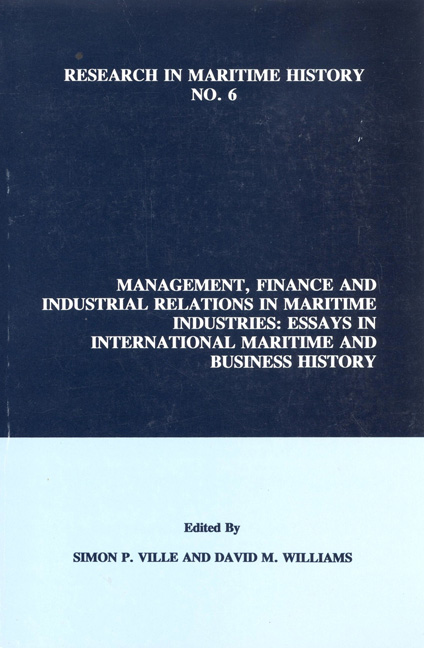 Management, Finance and Industrial Relations in Maritime Industries
Management, Finance and Industrial Relations in Maritime Industries Book contents
- Frontmatter
- Contents
- Contributors
- Introduction
- Contributors
- “Economic Theory, Information and Management in Shipbroking: Fearnley and Eger as a Case Study, 1869-1972”
- “The Early Nineteenth-Century Port of London: Management and Labour in Three Dock Companies, 1800-1825”
- “Owners and Masters: Management and Managerial Skills in the Finnish Ocean-Going Merchant Fleet, c. 1840-1880”
- “Management, Profitability and Finance in Twentieth-Century Spanish Merchant Shipping: The Compañía Maritima Del Nervion as a Case Study, 1899-1986”
- “Twentieth-Century Shipping Strategies: Broström and Transatlantic, Gothenburg's Leading Shipping Companies”
- “Contractors' Bounties or Due Consideration?: Evidence on the Commercial Nature of The Royal Mail Steam Packet Company's Mail Contracts, 1842-1905”
- “Patterns of Ownership and Finance in the Greek Deep-Sea Steamship Fleet, 1880-1914”
- “Financial Weakness and Industrial Conflict in Italian Shipbuilding Between the Two World Wars”
- “Responding to the Global Market in Boom and Recession: Japanese Shipping and Shipbuilding Industries, 1945- 1980
“Contractors' Bounties or Due Consideration?: Evidence on the Commercial Nature of The Royal Mail Steam Packet Company's Mail Contracts, 1842-1905”
from Contributors
- Frontmatter
- Contents
- Contributors
- Introduction
- Contributors
- “Economic Theory, Information and Management in Shipbroking: Fearnley and Eger as a Case Study, 1869-1972”
- “The Early Nineteenth-Century Port of London: Management and Labour in Three Dock Companies, 1800-1825”
- “Owners and Masters: Management and Managerial Skills in the Finnish Ocean-Going Merchant Fleet, c. 1840-1880”
- “Management, Profitability and Finance in Twentieth-Century Spanish Merchant Shipping: The Compañía Maritima Del Nervion as a Case Study, 1899-1986”
- “Twentieth-Century Shipping Strategies: Broström and Transatlantic, Gothenburg's Leading Shipping Companies”
- “Contractors' Bounties or Due Consideration?: Evidence on the Commercial Nature of The Royal Mail Steam Packet Company's Mail Contracts, 1842-1905”
- “Patterns of Ownership and Finance in the Greek Deep-Sea Steamship Fleet, 1880-1914”
- “Financial Weakness and Industrial Conflict in Italian Shipbuilding Between the Two World Wars”
- “Responding to the Global Market in Boom and Recession: Japanese Shipping and Shipbuilding Industries, 1945- 1980
Summary
Introduction
It is a curious feature of British economic history that in the midnineteenth century, traditionally the high-water mark of laissez-faire, the government negotiated a series of postal contracts with the private sector. At first through the Admiralty and later through the Post Office, officials placed the carriage of mails on overseas routes with commercial shipping companies. The north Atlantic route was granted to Samuel Cunard and his associates in 1839; the Peninsular Company undertook to carry mails to the Mediterranean; and the Royal Mail Steam Packet Company was in 1840 awarded a contract for a service to the West Indies. By the 1850s British shipowners operated contracts to Africa, Australia, the Far East and South America. Among the original firms, the Peninsular and Oriental Company (P&O) extended its mail line from the Mediterranean and Royal Mail (RM) added Brazil and the River Plate to its Caribbean services. New contractors, like the Union Company and the Pacific Steam Navigation Company, began mail services to South Africa and the Pacific coast, respectively.
These agreements typically provided fees well in excess of anticipated postal revenues, a practice which contradicted all that extreme free traders and supporters of laissez-faire represented. Historians have seen these payments not as part of a commercial contract but, particularly when paid by the Admiralty, as a deliberate subsidy to shipowners, in part to further the state's imperial and naval objectives. Jesse Saugstad regarded Britain's nineteenth-century postal contracts as state aid to shipping, while Sidney Pollard argued that the British merchant marine has never been left entirely to competition, although Britain granted subsidies less openly than France, hiding them in postal subventions, payments for auxiliary cruisers, loans, Admiralty contracts and the hire of troop transports. Similarly, Freda Harcourt has recently referred to oceanic mail contracts (and the contracting companies) as “subsidised.“
A subsidy is a “grant of public money in aid of some enterprise or industry, or to keep down the price of a commodity;” within this meaning, overseas mail services involved subsidies because, given the state's pricing policy, postal revenues could not cover the capital and operating costs of a dedicated fleet, whether operated by the Post Office, as in the period 1832-1836, or by another contractor.
- Type
- Chapter
- Information
- Management, Finance and Industrial Relations in Maritime IndustriesEssays in International Maritime and Business History, pp. 111 - 138Publisher: Liverpool University PressPrint publication year: 1994


